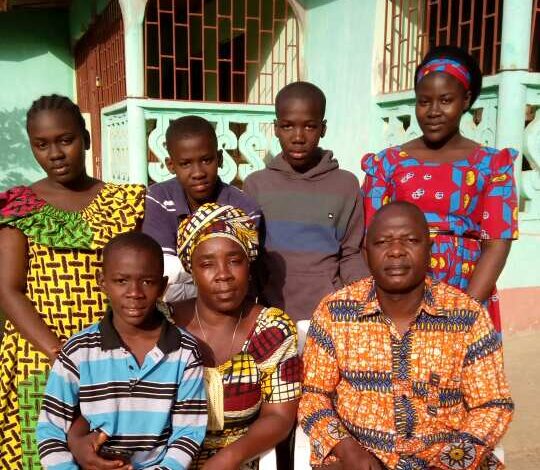About The Missionary
Liberia was the first independent black republic in Africa. In 1822 freed slaves were returned to Africa from the USA by President James Monroe and the nation of Liberia was born. Monrovia became its capital. The Liberian flag resembles the American flag, and Liberia has always used U.S. currency.
Rev. Edwin Gbor has a heart for his people. During the 1990’s and up until 2003, the country of Liberia was in turmoil and civil war. Edwin lived in the Ivory Coast as a refugee during that time. American missionaries there suggested that he go to Ghana to complete his Bible education. Edwin a native of Liberia, completed the diploma course at Ghana Baptist Theological Institute in 1996, then returned to war-torn Liberia to serve as a church planter and missionary. Edwin’s wife, Esther, and their children are actively involved in the ministry of evangelism, discipleship, church planting, and Christian education. In 2002, he returned to Ghana and completed the work for a Bachelor of Arts degree, and he recently completed his Master’s degree.
Edwin has been an IPM missionary since his return to Liberia in 1996. He is the founder of the Great Commission Baptist Church and the Great Commission Baptist Mission. The Christian Foundation School was also established and in 2019 had a growing student body.
Latest Prayer Letter
Project Giving Opportunities
Church Building Project
- Need: $120,000 - Raised: $70,300Updates From The Field
Sorry, there are no updates at this time.
About The Field:
Liberia, situated on the west coast of Africa, contends with a range of economic and social challenges that significantly impact its population, influenced by ongoing complexities in its current situation.
Economically, Liberia faces challenges such as overreliance on commodity exports, particularly rubber and iron ore, vulnerability to global market fluctuations, and limited economic diversification. The country has struggled with the aftermath of the Ebola epidemic (2014-2016), further impacting its economic stability and health infrastructure.
Social challenges in Liberia are diverse and profound. Access to quality education remains a concern, with disparities in educational resources and infrastructure, especially in rural areas. Healthcare accessibility and affordability are major issues, leading to disparities in health outcomes and the nation’s overall health infrastructure.
Poverty affects a significant portion of Liberia’s population, contributing to social disparities and impacting living standards for many citizens, particularly in rural areas.
Environmental sustainability is a growing concern, with challenges related to deforestation, soil erosion, and the impact of climate change on agriculture, directly affecting livelihoods.
Liberia’s current situation involves ongoing efforts towards post-conflict recovery and political stability following a protracted civil war that ended in 2003. However, the legacy of conflict, coupled with political tensions, poses challenges to social cohesion and national reconciliation.
Issues related to governance, corruption, and the effectiveness of public institutions also influence social complexities, impacting public trust and stability.
